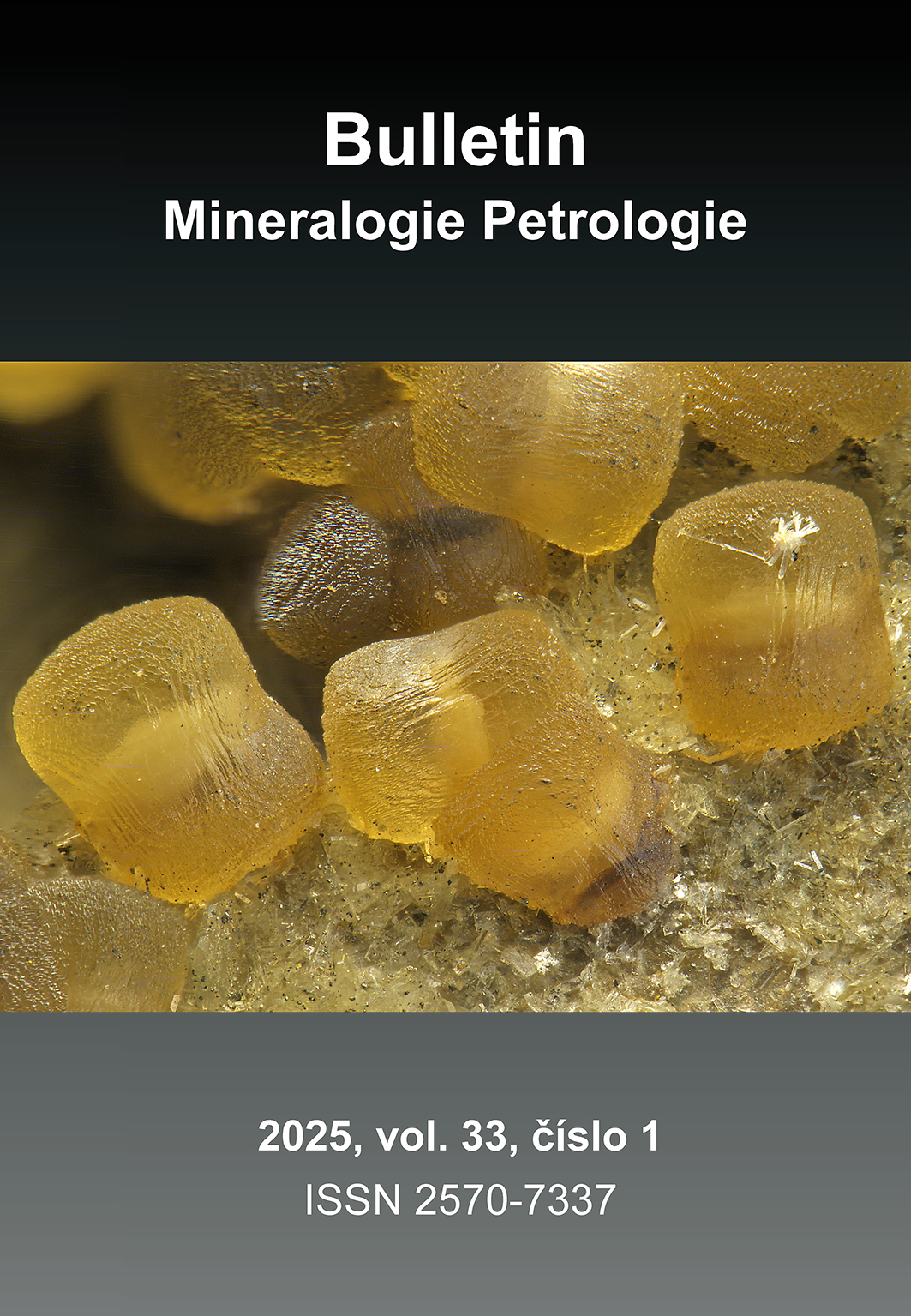Krystalová struktura phurcalitu, Ca2[(UO2)3O2(PO4)2]·7H2O, z Jáchymova
Crystal structure of phurcalite, Ca2[(UO2)3O2(PO4)2]·7H2O, from Jáchymov
Klíčová slova
Abstrakt
A rare supergene uranyl phosphate mineral, phurcalite, was found on a few specimens originating from the dump material of the Eduard shaft, the Jáchymov ore district, Czech Republic. Phurcalite forms yellow to yellowish-orange perfect prismatic crystals, reaching up to 3 - 4 mm in cavities of vuggy quartz-dominated gangue. Phurcalite was found in the association with walpurgite, uranophane-α, and members of the metatorbernite-metazeunerite series. According to single-crystal X-ray data phurcalite is orthorhombic, space group Pbca, with a 17.3785(8), b 15.9864(6), c 13.5477(6) Å, and V 3763.8(3) Å3. Its crystal structure has been refined to R = 3.56 % for 3488 unique observed reflections [Iobs>3σ(I)] collected on a Rigaku SuperNova X-ray diffractometer with an Atlas S2 CCD detector and focused MoKα radiation. The results of the structure refinement are in line with the recently published structure refinement of phurcalite from Shinkolobwe (Africa). Nevertheless, in phurcalite from Jáchymov, the substitution of As for P takes place at greater extent. The structural formula obtained for the crystal from Jáchymov is Ca2[(UO2)3O2(PO4)1.753(AsO4)0.247]·7H2O, Z = 8, Dcalc. = 4.409 g/cm3.
Soubory
Reference
Astilleros JM, Pinto AJ, Gonçalves MA, Sanchez-Pastor N, Fernandez-Diaz L (2013) In situ nanoscale observations of metatorbernite surfaces interacted with aqueous solutions. Environ Sci Technol 47: 2636-2644. https://doi.org/10.1021/es302781k
Atencio D, Neumann R, Silva AJGC, Mascarenhas YP (1991) Phurcalite from Perus, Sao Paulo, Brazil and redetermination of its crystal structure. Am Mineral 29: 95-105
Braithwaite RSW, Paar WH, Chisholm JE (1989) Phurcalite from Dartmoor, southwest England, and its identity with „nisaite“ from Portugal. Mineral Mag 53: 583-589. https://doi.org/10.1180/minmag.1989.053.373.09
Burns PC (2005) U6+ minerals and inorganic compounds: Insights into an expanded structural hierarchy of crystal structures. Can Mineral 43(6): 1839-1894. https://doi.org/10.2113/gscanmin.43.6.1839
Cantrell KJ, Deutsch WJ, Lindberg MJ (2011) Thermodynamic model for uranium release from Hanford Site Tank residual waste. Environ Sci Technol 45: 1473-1480. https://doi.org/10.1021/es1038968
Catalano JG, McKinley JP, Zachara JM, Heald SM, Smith SC, Brown GE Jr (2006) Changes in uranium speciation through a depth sequence of contaminated Hanford sediments. Environ Sci Technol 40: 2517-2524. https://doi.org/10.1021/es0520969
Dal Bo F, Hatert F, Philippo S (2017) New crystallographic data and formula revision of phuralumite, Al2[(UO2)3 (PO4)2O(OH)](OH)3(H2O)9. J Geosci 62: 87-95. https://doi.org/10.3190/jgeosci.233
Deliens M, Piret P (1978) La phurcalite, Ca2(UO2)3 (PO4)2(OH)4·4H2O, nouveau minéral. Bull Minéral 101: 356-358. https://doi.org/10.3406/bulmi.1978.7197
Demartin F, Diella V, Donzelli S, Gramaccioli CM, Pilati T (1991) The importance of accurate crystal structure determination of uranium minerals. I. Phosphuranylite KCa(H3O)3(UO2)7(PO4)4O4.8H2O. Acta Cryst B 47: 439-446. https://doi.org/10.1107/s010876819100099x
Finch RJ, Murakami T (1999) Systematics and paragenesis of uranium minerals. In: Burns PC, Finch RJ (eds) Uranium: Mineralogy, Geochemistry and the Environment. Rev Mineral Geochem 38: 91-180. https://doi.org/10.1515/9781501509193-008
Fuller CC, Bargar JR, Davis JA, Piana MJ (2002) Mechanisms of uranium interactions with hydroxyapatite: implications for groundwater remediation. Environ Sci Technol 36: 158-165. https://doi.org/10.1021/es0108483
Göb S, Guhring JE, Bau M, Markl G (2013) Remobilization of U and REE and the formation of secondary minerals in oxidized U deposits. Am Mineral 98: 530-548. https://doi.org/10.2138/am.2013.4275
Ilton ES, Zachara JM, Moore DA, McKinley JP, Eckberg AD, Cahill CL, Felmy AR (2010) Dissolution study of metatorbernite: thermodynamic properties and the effect of pH and phosphate. Environ Sci Technol 44: 7521-7526. https://doi.org/10.1021/es101619f
Krivovichev SV, Plášil J (2013) Mineralogy and crystallography of uranium. In: Burns PC, Sigmon GE (eds) Uranium: From Cradle to Grave. Mineralogical Association of Canada Short Courses 43, pp 15-119
Lussier AJ, Lopez RAK, Burns PC (2016) A revised and expanded structure hierarchy of natural and synthetic hexavalent uranium compounds. Can Mineral 54: 177-283. https://doi.org/10.3749/canmin.1500078
Maher K, Bargar JR, Brown GE Jr (2013) Environmental speciation of actinides. Inorg Chem 52: 3510-3532. https://doi.org/10.1021/ic301686d
Mills SJ, Birch WD, Kolitsch U, Mumme WG, Grey IE (2008) Lakebogaite, CaNaFe3+2H(UO2)2(PO4)4(OH)2(H2O)8, a new uranyl phosphate with a unique crystal structure from Victoria, Australia. Am Mineral 93: 691-697. https://doi.org/10.2138/am.2008.2706
Murakami T, Ohnuki T, Isobe H, Sato T (1997) Mobility of uranium during weathering. Amer Mineral 88: 888-899. https://doi.org/10.2138/am-1997-9-1006
Ondruš P, Veselovský F, Hloušek J, Skála R, Vavřín I, Frýda J, Čejka J, Gabašová A (1997) Secondary minerals of the Jáchymov (Joachimsthal) ore district. J Czech Geol Soc 42: 3-69
Pekov IV, Levitskiy VV, Krivovichev SV, Zolotarev AA, Chukanov NV, Bryzgalov IA, Zadov AE (2012) New nickel-uranium-arsenic mineral species from the oxidation zone of the Belorechenskoye deposit, northern Caucasus, Russia: II. Dymkovite, Ni(UO2)2(As3+O3)2·7H2O, a seelite-related arsenite. Eur J Mineral 24: 923-930. https://doi.org/10.1127/0935-1221/2012/0024-2219
Petříček V, Dušek M, Palatinus L (2014) Crystallographic computing system JANA2006: General features. Z Kristallogr 229: 345-352. https://doi.org/10.1515/zkri-2014-1737
Piret P, Piret-Meunier J (1988) Nouvelle détermination de la structure cristalline de la dumontite Pb2[(UO2)3 O2(PO4)2]·5H2O. Bull Minéral 111: 439-442. https://doi.org/10.3406/bulmi.1988.8091
Piret P, Deliens M, Piret-Meunier J (1988) La françoisite-(Nd), nouveau phosphate d’uranyle et de terres rares; propriétés et structure cristalline. Bull Minéral 111: 443-449. https://doi.org/10.3406/bulmi.1988.8091
Plášil J (2014) Oxidation-hydration weathering of uraninite: the current state-of-knowledge. J Geosci 59: 99-114. https://doi.org/10.3190/jgeosci.163
Plášil J, Sejkora J, Ondruš P, Veselovský F, Beran P, Goliáš V (2006) Supergene minerals in the Horní Slavkov uranium ore district, Czech Republic. J Czech Geol Soc 51: 149-158. https://doi.org/10.3190/jcgs.991
Plášil J, Sejkora J, Čejka J, Škoda R, Goliáš V (2009) Supergene mineralization of the Medvědín uranium deposit, Krkonoše Mountains, Czech Republic. J Geosci 54: 15-56. https://doi.org/10.3190/jgeosci.029
Plášil J, Sejkora J, Čejka J, Novák M, Viñals J, Ondruš P, Veselovský F, Škácha P, Jehlička J, Goliáš V, Hloušek J (2010) Metarauchite, Ni(UO2)2(AsO4)2·8H2O, from Jáchymov, Czech Republic, and Schneeberg, Germany: a new member of the autunite group. Can Mineral 48: 335-350. https://doi.org/10.3749/canmin.48.2.335
Plášil J, Kiefer B, Ghazisaeed S, Philippo S (2020) Hydrogen bonding in the crystal structure of phurcalite, Ca2[(UO2)3O2(PO4)2]·7H2O: single-crystal X-ray study and TORQUE calculations. Acta Cryst B 76: 502-509. https://doi.org/10.1107/s2052520620005739
